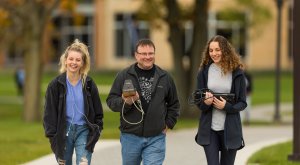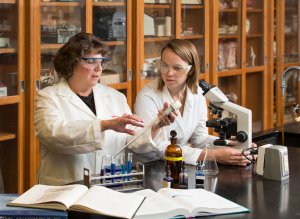A Helping Hand

Valpo faculty are invested in the success of their students and recognize the potential barriers students face in college. First-generation faculty like Beth Scaglione-Sewell, Ph.D., professor of biology and director of the undergraduate anatomy lab, and Bob Clark, Ph.D., associate professor of chemistry and director of the MSEED program, want students to know they can ask for help.
“When I first started teaching in higher education, I had this impression that everything was equally balanced between students,” Professor Scaglione-Sewell says. “As I got to know students better, I began to see the changing pressures of additional jobs, issues with access to technology, and feelings of imposter syndrome that students deal with, especially first-generation students.”
Professor Clark remembers having exactly those feelings when he was a student. “I was insecure about balancing work and

school, but I didn’t want people to know I didn’t know what I was doing, so I didn’t ask for help,” Professor Clark says. “I should have. Even now, I still can feel insecure and like an imposter, but where I’ve changed over the course of many years, is I became more okay with letting people know I have shortcomings and things to be learned.”
With guidance opportunities in and out of the classroom, faculty like Professor Clark and Professor Scaglione-Sewell want to do everything in their power to help students reach their full potential. Their guidance goes beyond navigating assignments.
“I spend a lot of my time in classes just laying it out there for students, first-generation or not, saying ‘here’s what I wish I knew when I was a student, I don’t want you to fail in the same way I felt I failed’,” says Professor Clark. “I try to make my classes about chemistry, and study skills, and team building.”
One of Professor Scaglione-Sewell’s professors took her under her wing during her undergraduate years at Simpson College when the time came for graduate school applications. Planning, applying, and paying for graduate school were all challenges Professor Scaglione-Sewell’s professors helped her navigate.
Looking back at her experience and what she sees in students now, Professor Scaglione-Sewell knows first-generation students sometimes need extra encouragement to connect with professors. “One of the classes I teach is anatomy and physiology, a class that can have 150¬–200 students. I think students can be less inclined to reach out because of the size of the class, but hopefully this can be the sign they need to help them feel like they can reach out and find help.”
At Valpo, students’ full potential receives the total commitment of all faculty and staff. “We don’t accept students and not provide what they need to succeed. You chose us; we also chose you,” Professor Scaglione-Sewell says. “You can trust your professors to help you in every way they can. If you need a little more, all you need to do is ask.”
“One of the best things we do as faculty is create inclusive spaces, give students the tools they need, and then help them understand their toolkit of skills to prepare themselves and use their skills to their advantages,” Professor Clark agrees.
